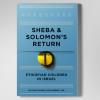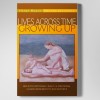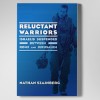9-25-05 Sunday
This one hard to write. About my wonderful, former Ivrit teacher, now living in Herzeliya and seeing the adverse changes in her. The next day, Shabbat, a striking contrast when I am invited at synagogue, Kinor David, (David’s lyre), to lunch at Anglos’ house (Australia and South America, both of whom lived in Palo Alto couple
years). Have put off wriitng this for couple days, in part to integrate, absorb the distress of that Friday night.
Now, sitting in new house where I am renting a room. I sit in the foyer directly beneath the fan, as the heat has not dissipated by 830 pm (although I did do some baking for dinner). Owner’s cats have evaporated, but not the cockroaches. I have a new second-hand bed (with a latex mattress, I was told) and have emptied one of my two 70 lb luggages; the second is mostly my Freud. Connecting the computer to the internet not as easy as I had hoped. But Bezeq (the ATT of Israel, prior to the break-up of ATT) man comes Wed. Let’s see what happens. Wiht good fortune, it may mean that I no longer lug my lap top around town on my back and seek coffees at Ilan’s so I can hook up with their WiFi . The other fine coffee shop, also AC’d, says it has wifi, but has not worked for better than a week. It’s at the other end of Ahuza Street, where I usually hike .
After a bit of jockeying phone calls, Y., my beloved teacher arranged for Fri night I should join them. them includes her hubby B., who works for some computer do-dad place that is still doing well. Their be-ringleted daughter A., beautiful A., whom I knew when she was 2 in SF, and is now about 7 and remembers me clearly from then; their son, E., who is of stoic face, breaks into a surreptitious smile in the car’s back seat when I hand him a wind-up frog from Toyboat. Froggy does back-flips (and lands on its feet). Baby Yari is the new addition whom I haven’t met. (The name means something like “brings my light”.)
I slip out of synagogue early, as Y. said she would pick me up at 650 on Ahuza (natch) on the way to get A. at her friends b-day party at the bowling alley in the mall. Now, I have slipped out early twice from Kinor David on fri night. Although they start earlier than other synagogues, with all the singing and dancing and clapping and hoo-haw, they go longer. (And Tzvi Koren, the rabbi noticed from when I slipped out last time. Not a sparrow falls from the heavens, that god does not notice.) But it is more awkward, bec I am standing a half block from the shul and waiting for a ride, on shabbat. I do remove my kippah, but I don’t think this is enough to disguise me; I seem to have a recognizable, even memorable face. It would not be good for me to be sought by Interpol — too easy to catch my mug. Then I wait, shifting from leg to leg, trying to camouflage myself against a light pole; uncertain from which direction they will come, or the type of car. I feel a bit undercover, without a fedora brim to pull over my brow.
Nu, comes the car. And it is hubby B., to my disappointment (not Y.) . Also, he is late. Also, he goes to get A. and gets lost. He is poker faced about all this; calls Y., finds the entrance to the parkiing lot, then drives beyond it. backs up. asks how to get to the bowling alley. Of course, all we have to do is follow the blockades, the sawhorses, the red-plastic tape blocking off the entrance, and we know where to go: exactly where it is obstructed. I recognize A., a Shirley Temple knock-off, right away, and she me. She introduces me to her best friend, Dror (I learned what this meant a few days ago and have gotten good at forgetting what I have learned — I think it means song). They profess their love for each other, although later, as A. gets more comfortable at the house, over challa, she confesses, well, brags that another boy likes her and she him: they have even challenged each other to jump off a table. And succeeded without getting hurt. We arrive and Y. comes out with little Y.; she is as lovely as I recall, bright red hair, tightly curled, held back. Her son, 18 months, is a mirror image and clings to her side, or her breast most of the night. As he breast feeds, he extends his arm to touch her neck, just beneath her jaw (not always tenderly, on the edge); gazes at her, until he gets drowsy, then shakes himself as if to remain awake longer to look at her.
There house is a bit of a castle among Israelis; yet I recall sleeping in the upper bedroom around 2001 and seeing the lights of Tul Karem, not too distant. (Then, the city lights of Palestinian villages were a different color than Israeli ones, as I recall — yellowish.) Because of the heat, Y. wears a dress with a scoop back, so that one can see her surgical scar, from her spinal rod insertion as a child for scoliosis. From what I know, this contributed to her sense of uncertainty about herself, even as she at some level knows that people have considered her very bright. Of Syrian background, she grew up in Tiberius. While known as a dwelling place for Christ, for his walks on water, it was and remains a sadly impovershed village-town on the shore of a peaceful lake Kinneret, its blue waters showing beautifully at sunset as the shore opposite, the Golan heights turn dusty pink and white sea birds weave like shuttle cocks from water to cliffs. It is a town more god forsaken, than blessed. She did so well in school that she was given an unusual temporary exception from the army to study at the Hebrew university, provided she studied arabic and her GPA never dropped below 4.0. In exchange, she joined the army after school and worked in Intelligence. She is fluent in some five dialects of Arabic; reads, writes, speaks. Her brother is an attack helicopter pilot, in the unit founded by Nehamia Dagan (whom I interviewed for my book). Why I tell you all this? She married B., whom she met at the university. B. got a genetics BA, then decided he didn’t want to do graduate work and got this well-paying job at a high tech firm. They sent him to SF, where I met Y.. She taught Hebrew at the JCC, thinking herself not good enough to teach Arabic at Berkeley. (To my good fortune, but I think to her disadvantage.) She has since learned that she is a very adept Arabic teacher; one of her pupils, dyslexic in Hebrew, has learned to read Arabic fluently. (But as a psychoanalyst, I would venture that if Y. were teaching Urdu, ancient Akkadian or classical Japanese, her student would have learned it fluently. I think of Rudy Ekstein’s book, with its wonderful title, From Learning for Love to Loving to Learn.) (Ekstein once supervised me in Chicago, sitting in the analytic insttitue’s library. When he dozed off, I thought all was lost. When I finished, he awoke and discussed the case articulately. For payment, he asked that I drive him to his next appointment, which Idid in my mustard yellow, slant six Dodge Dart. he called himself, Rudy Appleseed on his travels.)
The dinner went swimmingly, sort of. Y. spent the day shopping and cooking. B. once proudly announced some years ago at a dinner party for several people at his house, that he always seated himself in the corner of the room, then would offer to help, as it was clear that he couldn’t get out of his seat. Clever him. Now, he no longer has a corner seat, but manages to disappear for dinner preparation or helping with the children; reappeaers when the liver is served. He
loves liver, which in Hebrew is “kaved,” a homonym for the word, “heavy.” Both A. and E. want to show what they can do. Y. worries about showing me A.’s art work, as it may intimidate E.; but A. was last year invited into the semiprofessional children’s choir, the youngest child to join. wehn tehy toured to Barcelona, however, Y. din’t let
her go. A.’s protrait of flying horses, limbs extended, soaring through forests, are up on the kitchen wall; one made into a serving tray. E., not to be overshadowed, shows me how he can make paper airplances, paper snowflake cutouts, and pictures of zombies. I make him a jet plane (and extra fold in the nose I learned from one of my patients, gives it distance and better aim). He marvels that it doesn’t crash on landing.
A. entertains herself, but also treasures the fluttering bumble bee I brought from Toyboat; also, the soap bubbles I brought for Y. she blows above his head so that he can bat and pop them. it is as we move to the living room that the tenor changes. (I brought an extraordinarily lucious chocolate cake from Roladin’s; breakfast for the kids, Y. promised, but we adults did not have to wait.) B. has disappeared and Y. tells me first how exhausting her teaching job is, and how gratify\ing. At a school modeled after Summerhill (kids vote equally with teachers; a judicial panel of kids and teachers to consider complaints , etc..). while she doesn t think much of how the school benefits the kids, she is teaching the highest national level of Arabic, and her kids are getting the highest national ratings. Damn good. but, she confessses that at home, she is distressed; hollering at the kids in the am to get ready. Once asked B. to get them ready at 7 am ,as she had been up all night withthe baby, who sleeps wtih them. At 730, A. , s till pajamed, was out inthe yard, petting a cat; and B. was in outer space. He just forgot. She confeses for the first time to me, that it seems to her she has four children; and all four have an ability to get into creative dream-like states. that she is too down to earth; wishes she coudl be like them; still doesnt’ consider hersefl creative like them, although she now realizes that she is a fine Arabic teacher. all this to say as prelude to what follows, how the deeply personal can find external experiences to justify inner misery, rather to distract oneself from the inner resources of misery. (This is not to dismiss opinions fo the political world, which may still be valid; only that cleaning ones’ inner slate helps one see the external world with greater clarity.)
Enough Prelude. B. joins us, lounges on the couch and picks up where he strated when he was driving me to the house: how lousy is this country, how lousy is this and every government that preceded it, and how he is more comfortable her than anywhere else. But they both elaborate.
B. litigates something short of this: the state of Israel is run by maybe 50 people; it doesn’t matter who is p.m., the same people run it. 40% of all kids eligable for army are finding ways to get out of this. (I am only quoting — have no idea about accuracy.) All the wars fought by israel (he starts to make an exception of the ’48 war, but doesn’t finish the sentence) were unnecessary wars, promulgated by the Israelis. He gives some examples: the Yom Kippur war, he claims, started by the Israelis only because the Arab armies were on its borders: maybe they wouldn’t have advanced had Israel done nothing; the six-day war, ibid. The ’56 war, for sure. The intifiadas, definitely israel’s provocation.
I listen. With difficulty. He now states that he will teach his children to never want to be in the army. (Wise Y, tells him that proscribing them from army will likely get them to want to join. B. responds, then he will trick them and encourage them to join the army, so that they won’t want to.) Later in the car on the way back, he says that in maybe 30 years there won’t be a Jewish state anyhow; demographics and such. Ok maybe 50 years. and “Lo echpat li,” “doesn’t bother me,” he shrugs. (You gather why this Shabbat dinner is challenging for me, a new oleh.) But it ain’t over yet.
Y. has been teaching and reading the Arab literature, mostly Palestinian. She tells me of the powerful writing of a Palestinian (whose name I can’t recall, although one of his books is , “Man in the Sand.) She tells me sseveral times that the Israeli army killed him in Lebanon. She also tells me later that this man insisted that the Jews must be wiped out completely and the Palestinians should move back to Israel. This doesn’t seem to mitigate Y’s outrage at Israel’s killing him. (I remember that her brother’s training with Cobra’s was specifically on isolating a target and killing the man. But I say nothing.) She says that she was raised believing that all the wars were necessary, the Jews in danger. Now she bleieves otherwise, nodding towards B. She says that it is hidden frm Israelis what the Jewish state did to the Arabs. That the Palestinians had a tradition of running away from home during a war, then returning when it was
over. This time, the Israelis would not let them return.
When I mention the mufti’s public radio announcements telling the Arabs to leave so that the Arab armies would kill the Jews, drive them into the sea, then the Palestinians return, either she or B. tell me that people have gone back and listened to the radio broadcasts and that the mufti did not say this exactly. Now, I know not what to believe, but have an uneasy feeling I am in the midst of a folie a deux. Y. says that before ’48 there were 400 arab villages; now something like 80. She insists that we must see the world from their perspective and their perspective and language and culture are different than ours. (Terribly different, I add in my mind.) Whatever they think, she says, we have to
live with them. Perhaps, she adds in a moment of desperation, they are Jews who were left behind after the dispersion of Jews.
She continues to tell me the details of the Palestinian’s book Man in the Sand. clearly a compelling writer, and like compelling writers, does not owe the truth of history to anyone; he is not an historian. But the gist of the book is after being driven from Israel, Arab men have lost all their pride before their families; they are broken. In the book, three Palestinian men try to get to Kuwait or someplace far to get work; try to smuggle across in a water truck through Saudi arabia and die in the truck. She clearly feels with these men. B. continues that when you destroy a man’s livelihood
displace him, it is completely destructive. At this point, I do what i have some regrets about doing. Y. does not know my background. My father’s entire family (but one) was killed and burned in Auschwitz; likely my father had the stink of their ashes up his nostrils some days. He wasn’t only displaced. I was born between displaced person’s camps. My father’s mother’s family were the Poznanskis. (The main street in Lodz is Poznanski street; the current mayor’s home was stolen from the murdered Poznanskis.) I don’t walk around saying I still have the key to their flat, their industries, their apartment houses, insisting the Poles living there should be wiped out so that I can move back; that I can’t live without going to my Polish homeland. In fact, my father’s “curse” to the Poles is that they should live with themselves. My father and mother’s approach: you move and build a new home and educate and raise your children. A pretty good revenge, I dare say.
I don’t get to say all this to Y and B. Y. stops me. Nothing, she says, matches the Shoah.
I turn the subject to their children, to hopeful possibilities of the future, which they permit and B. drives me home.
I am worn out simply writing about this. Feel I should add here the remarkable hopefullnesss of the shabbat lunch the next day. But I do have to do some Hebrew to study tonight. So, good night and be well.



